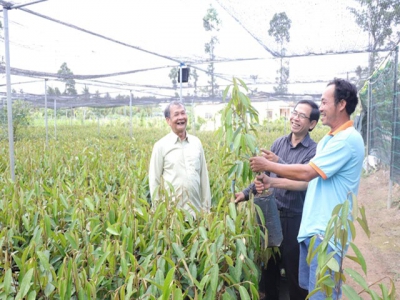Countrys largest seedling producer focuses on quality

BẾN TRE – Bến Tre Province, the Cửu Long (Mekong) Delta’s largest producer of fruit, vegetable and other seedlings, has strengthened quality management to promote its seedling brands and agriculture produce.
A seedling nursery in Bến Tre Province. – VNA/VNS Photo Huỳnh Phúc Hậu
Bùi Văn Lâm, director of the province’s Department of Agriculture and Rural Development, said the quality of seedlings impacts the yields and quality of agriculture produce, and so the province seeks to adopt advanced techniques and invest in infrastructure required to grow seedlings.
Authorities would monitor all households that grow or trade seedlings to ensure they are of clear origin and consistent quality, he said.
All seedlings would be certified, he said.
Nguyễn Hữu Lập, deputy chairman of the province People’s Committee, said the province’s agriculture produce is diversified and well known, and includes xiêm xanh coconut (a speciality variety used for its juice), green skin and pink flesh grapefruit, durian, Cái Mơn mangosteen, Ba Tri cows, Mỏ Cày Nam pigs, and Thạnh Phú mud crabs.
Seedling production is one of the eight key products for which it has built value chains, he said.
Its fruit, flower and ornamental plant seedlings are preferred by customers all over the country, he said.
Bến Tre also exports them to Cambodia and Laos.
Chợ Lách District, its largest seedling producer, has 1,600ha devoted to producing around 40 million seedlings and 15 million pots of flowers and ornamental plants annually, according to its People’s Committee.
It has 31 villages that grow seedlings, flowers and ornamental plants.
Many farmers in the district have switched to growing the seedlings in recent years as it offers higher profits than crops.
But its seedling production remains on a small scale and scattered.
Lê Văn Đơn, deputy head of the Chợ Lách Bureau of Agriculture and Rural Development, said the district has set up a programme to manage and improve seedling quality.
The programme helps farmers register the plants from which the germinating seeds were obtained with competent agencies.
Twenty eight such plants and 90 orchards in the district have been registered.
To meet the market’s demands in terms of quality and quantity, the province has encouraged farmers to establish co-operatives for growing seedlings.
It has taken several measures to improve the efficiency of co-operatives like providing their managers with training in management skills and offering support policies.
The Thắng Lợi Agricultural Co-operative in Chợ Lách’s Long Thới Commune was established last September to trade agricultural inputs, tools and services and produce seedlings.
Phạm Hồng Khánh, its chairman, said if farmers want to integrate into the market, they have to work towards a co-operative economy and sustainable production.
Their products should have high quality and clear origins, he said.
“The biggest difficulty for individual farmers is that they produce products based on [the latest] trends, depend on the market and lack secure outlets.”
Members register their production quantity, are taught farming techniques and offered guaranteed outlets, he added. – VNS
Inbox
Saltwater intrusion affects seedling production
BẾN TRE – Saltwater intrusion in Bến Tre Province is affecting seedling production and farmers have taken measures to secure irrigation water, according to local authorities.
Saltwater intrusion has occurred 45 – 76km up the province’s main rivers, causing salinity of 1 - 4 parts per thousand, affecting three fourths of Chợ Lách District, which is situated furthest from the sea.
The district’s farmers now regularly monitor the salinity of irrigation canals and rivers to draw water and store in ponds or containers when it is low and suitable for irrigation.
Many have to buy water from elsewhere.
Others have adopted efficient irrigation methods like automatic spraying systems or are manually irrigating the roots of seedlings.
Bùi Thanh Liêm, head of the Chợ Lách Bureau of Agriculture and Rural Development, said after the severe saltwater intrusion in the 2015 – 16 dry season, seedling farmers in Chợ Lách have proactively taken measures to cope with the salinity since seedlings are not very resistant to saltwater.
Authorities have taught farmers water storing models and farming techniques to mitigate the impact of saltwater intrusion, he said.
Saltwater intrusion is forecast to occur until May.
Related news
 Ninh Thuận targets sustainable grape production
Ninh Thuận targets sustainable grape production The south-central province of Ninh Thuận Province, the country’s largest grape producer, is targeting sustainable grape production after conducting
 Export of main agricultural products down 5.3 percent in 2019
Export of main agricultural products down 5.3 percent in 2019 The combined export value of main agricultural products was estimated at 18.5 billion USD in 2019, down 5.3 percent year on year
 Asia Coffee-Vietnam sees thin trade as farmers not keen to sell at low prices
Asia Coffee-Vietnam sees thin trade as farmers not keen to sell at low prices Farmers in the Central Highlands, Vietnam’s largest coffee-growing area, sold coffee COFVN-DAK at 33,600 dong ($1.45) per kg, flat from last week.